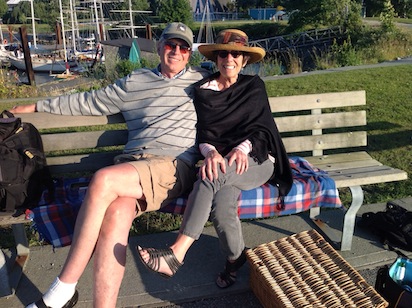
Benching in Vancouver
By Dell Catherall“Cities have the capability of providing something for everybody, only
because, and only when, they are created by everybody.”
Jane Jacobs
It’s my husband’s suggestion—a series of dinner picnics on Vancouver’s benches. “You know, the ones we stride past and never use.” The proposal is so appealing I ignore the pointed allusion to my rushing through life and missing the details. “A summer project. Great idea, hon.”
We set parameters. Each location must have an ocean outlook, people watching opportunities and a view of the setting sun. The food, eclectic—purchased from the cities vast array of ethnic delicatessens. And why not live dangerously with two piccolos of champagne?
June 21st, on a grassy knoll high above the Stanley Park seawall we’re sitting on a bench dipping our pita bread into taramosalata enjoying our first picnic and the breathtaking view of Burrard Inlet. We become aware of a drama unfolding to our right. “Do you take this woman to become your lawfully wedded wife?” It’s a wedding ceremony that includes a justice of the peace, a few friends, us and a squawking crow rudely attacking a circling eagle. Once married, the two brides kiss and throw back their heads in laughter. As they pass our bench and wave, we raise teacups of bubbly and toast their joy.
The love theme continues to a picnic on Elsje Point. This tiny peninsula jutting into the mouth of False Creek honors Elsje de Ridder, recognizing her 35 years of volunteer service to the city she loved. Once a chairwoman of the Maritime Museum Board of Trustees she was an avid supporter of local musicians and the sea. There are 13 benches bordering her point, so close to the water, you can almost dip in your toes and join the stand-up paddle boarders and kayakers. We choose to sit on Diana and Michael’s bench. The quote on their plaque: Lucky is the man who is the first love of a woman. Luckier is the woman who is the last love of a man. It’s our story too. It was 1959, Mr. Calder’s grade 10 science class at Magee Secondary. Some guy in the desk behind yanked my ponytail. I swivelled around and locked eyes with the man sitting beside me on the bench today.
It’s an honour to visit memorials donated by family members or friends. For a short time, they become our hosts. Our Spanish Banks bench is a tribute to Peter: …you are the light in our Dark World, the Fire that always burns…. I later find an obituary on the internet that describes him as a skilled motorcycle mechanic, riding high and living free.
According to the annual report issued by Freedom House for 2014 there are 47 countries with no political rights or civil liberties and 58 that are partly free. I think of the images in this morning’s newspaper of the increasing violence in the Middle East. As we open our cooler and set out a channa salad, the butter chicken and eggplant bhartha my husband and I are once again aware of how fortunate we are to be living in Vancouver and able to eat a sumptuous meal at a beach where the sands don’t run with blood and children swim. A land where a man like Peter soars like an eagle.
Inscriptions inspire. On Warren Ho’s bench the family has written: we are here to add what we can to life, not to get what we can from life. As we enjoy rye bread, gelfite fish and potato salad from a Jewish deli we consider both the cultural diversity of our city and the shared commitment of its residents. Vancouverites are passionate about their green spaces. Mr. Ho would probably have admired the protesters who successfully fought the proposed bike path in nearby Haddon Park and lauded a city where public input matters.
Our Canada Day picnic is at English Bay, where every summer evening is a celebration. Sitting on Jean-Paul’s bench we watch the seawall’s glorious parade of humanity. An elegant Asian woman sheathed in red on the arm of a strutting body builder protecting her with a white silk umbrella. A caregiver pushing a stretcher, on what seems to be the mere brain of a man sensing the life around him. A group of African instrumentalists chanting their pleasure. Skateboarders carrying old fashioned boom boxes, grooving to their tunes.
Jean-Paul’s story is not so carefree. The engraving on his plaque: He had no enemies but himself. I think of my own father. A brilliant electrical engineer, one of Vancouver’s builders, whose private demons drove him to alcoholism and the Downtown Eastside. We eat a dinner from the JapaDog food truck and toast the courage of Vancouver’s homeless and the citizens that work to help them.
The evening’s grand finale leaves us gasping in awe as arcs of light blaze ever higher and burst into waterfalls of falling stars. On the drive home I suggest picnicking on a bench I’ve seen at the north end of Main Street in Crab Park. My husband nods. “Sounds good. A chance to see the harbour at work. And, we can grab some Poutine from the Flying Pig.”
Our benching adventures are a way to connect with souls of the past and meet some fascinating individuals of the present. Artists, dog walkers, pan-handlers, tourists—we speak with anyone who passes our bench and wants to share a story. One evening we are invited to join an extended family barbecue and play bocce ball. On another, we become part of a water-balloon fight.
Of course by mid October the rains will descend. But we’ve lived in Vancouver long enough to know that if we wear our gortex and huddle under the ubiquitous black umbrella while sitting on a bench drinking coffee, someone will stop to discuss the weather!
